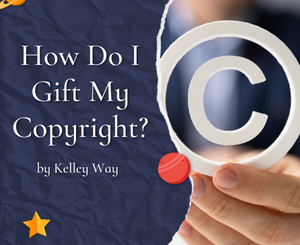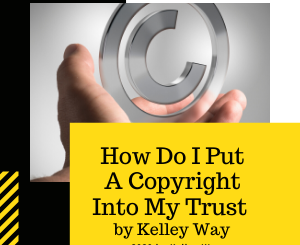Estate Planning for Authors by Kelley Way
 Let’s welcome back monthly columnist Kelley Way as she shares with us “Estate Planning for Authors.” Enjoy!
Let’s welcome back monthly columnist Kelley Way as she shares with us “Estate Planning for Authors.” Enjoy!
***
In my previous article, I talked about estate planning for musicians and the steps they could take to ensure their copyrights stayed profitable. In this article, I’ll be talking about estate planning for authors.
Minding Your Copyrights
The first thing authors should consider when creating a will and trust is their copyrights.
Suppose there is no explicit mention of your copyrights. In that case, it is considered part of the “residue” or “remainder” of the estate, meaning that it will go to whoever you’ve designated to receive the bulk of the estate after the specific distributions are done.
It’s certainly possible to leave things like that, but if your copyrights are producing income (or you think they could be in the right hands), then it’s worth considering some other options.
If the person you want to be in charge is also the person you wish to receive the income, then you can simply leave them your copyrights and be done with the matter.
Creating a Trust
But what if the person you want to be in charge of your copyrights is not the person you want to receive the income?
For example, perhaps you want your children to receive the income, but none of your children have the time, knowledge, or inclination to manage the copyrights to ensure that the income happens.
In that situation, leaving your copyrights in trust might be better, with the children as beneficiaries for any income.
Creating an LLC
Another possibility when considering estate planning for authors is to create an LLC for your copyrights.
Several people have asked me about this option, and it is a viable way to pass on copyrights and/or have one person in charge with someone else receiving income.
But several drawbacks should be noted.
First, LLCs do not avoid probate unless you include your ownership interest among your trust assets.
Second, it will not protect your assets from lawsuits since you will always be personally liable as the book’s author.
And third, there is an annual filing fee for LLCs in California, and it’s high enough that I wouldn’t recommend going this route unless your copyrights are producing at least $1000 each year.
All that said, it can still be a good option, particularly when a work has multiple authors.
Making Sure Things Go Smoothly
Once you’ve decided which of these methods best suits your circumstances, you can do a few things to ensure everything goes smoothly once you’re no longer at the helm.
First, have a portfolio that tracks your books, published and unpublished. Published books should have information on who the publisher is, how well the book sells, when to expect royalty payments, etc.
Unpublished books should have some basic notes on the status, so your manager can pick up where you left off.
Additionally, it’s helpful to your manager to have contact information for your agent, publisher, lawyer, or anyone else they may need to contact, so they can find out what’s going on with your books and update everyone with the manager’s contact information.
Lastly, make sure your manager can find all your contracts and licensing agreements in case they need to reference them in the future.
(If you don’t know where they are, make sure to find them or ask the other party for another copy. You can’t enforce your rights if you don’t know what your rights are.)
If you have any questions about estate planning for authors or need help navigating your estate plan in general, please feel free to email me at kaway@kawaylaw.com.
***
Want to read more articles like this one Writer’s Fun Zone? Subscribe here.
***
ABOUT THE AUTHOR
Kelley Way was born and raised in Walnut Creek, California. She graduated from UC Davis with a B.A. in English, followed by a Juris Doctorate. Kelley is a member of the California Bar, and an aspiring writer of young adult fantasy novels. More information at kawaylaw.com.








“Second, it will not protect your assets from lawsuits since you will always be personally liable as the book’s author.”
Could you possibly expand on this? Or do you have another post that does? I’m very interested. Thanks!
Thanks for your question, Cheryl! I have passed it on to Kelley.
Hi Cheryl,
Thanks for asking! When someone sues for copyright infringement and/or defamation, they can sue the publisher for distributing the content, the current copyright owner for profiting from the content, and/or the author for creating the content. So even if you transfer the copyright to an LLC, or publish through an LLC, you can always still be sued as an individual for creating the content in the first place.